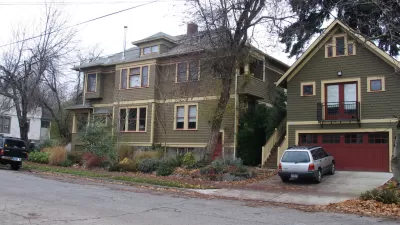The city of Monterey has been compelled by a new state law to loosen prohibitions on accessory dwelling units after failing to so earlier in the year.
"Monterey City Council revisited a half-century-old ban on building and renting out second units in 2016, and despite a well-documented housing shortage, voted to uphold that ban," according to an article by Nick Rahaim.
But a new state law, signed into law in September of this year, "is forcing the city to change course," reports Rahaim. Now "the Monterey Planning Commission will hold public comment on a proposed ordinance to accommodate the new state law" in November, with council action expected before the end of the year. Liam Dillon reported at the time of the bill's approval that it was "aimed at forcing local governments to approve the secondary housing units."
Monterey's new ordinance, resulting from the state law's influence, "would allow accessory dwellings in homes and existing detached structures in single-family neighborhoods to be converted to residences then rented out. A building permit and water credits would be required, but not additional parking…."
FULL STORY: Monterey forced to revisit ban on granny units.

Maui's Vacation Rental Debate Turns Ugly
Verbal attacks, misinformation campaigns and fistfights plague a high-stakes debate to convert thousands of vacation rentals into long-term housing.

Planetizen Federal Action Tracker
A weekly monitor of how Trump’s orders and actions are impacting planners and planning in America.

Chicago’s Ghost Rails
Just beneath the surface of the modern city lie the remnants of its expansive early 20th-century streetcar system.

Bend, Oregon Zoning Reforms Prioritize Small-Scale Housing
The city altered its zoning code to allow multi-family housing and eliminated parking mandates citywide.

Amtrak Cutting Jobs, Funding to High-Speed Rail
The agency plans to cut 10 percent of its workforce and has confirmed it will not fund new high-speed rail projects.

LA Denies Basic Services to Unhoused Residents
The city has repeatedly failed to respond to requests for trash pickup at encampment sites, and eliminated a program that provided mobile showers and toilets.
Urban Design for Planners 1: Software Tools
This six-course series explores essential urban design concepts using open source software and equips planners with the tools they need to participate fully in the urban design process.
Planning for Universal Design
Learn the tools for implementing Universal Design in planning regulations.
planning NEXT
Appalachian Highlands Housing Partners
Mpact (founded as Rail~Volution)
City of Camden Redevelopment Agency
City of Astoria
City of Portland
City of Laramie




























